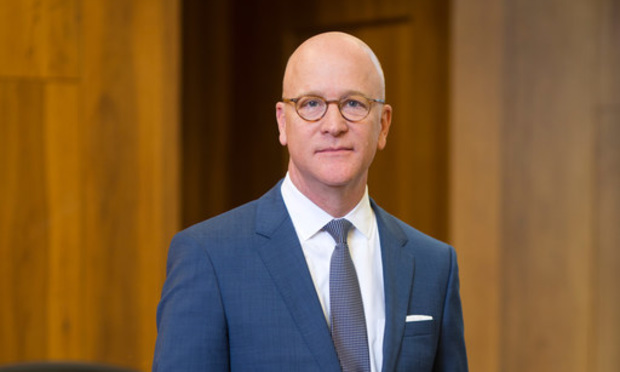Austin Federal Judge Overturns Law Banning Walmart from Selling Booze in Texas
In a decision that could soon allow Walmart to stock its retail shelves with whiskey, an Austin federal judge has struck down a Texas law prohibiting…
March 21, 2018 at 02:10 PM
3 minute read

In a decision that could soon allow Walmart to stock its retail shelves with whiskey, an Austin federal judge has struck down a Texas law prohibiting public corporations from obtaining permits to sell hard liquor in the state.
U.S. District Judge Robert Pitman ruled that the section of the Texas Alcoholic Beverage Code, which prevents public corporations from obtaining so-called “package store permits,” violates the dormant commerce clause of the U.S. Constitution. That doctrine forbids states from enacting laws that discriminate against interstate commerce.
Arkansas-based Walmart filed a suit challenging the law by suing the Texas Alcoholic Beverage Commission to prevent it from enforcing the public corporation ban. The Texas Package Stores Association, a trade organization that represents Texas owned liquor retailers who advocated for the public corporation ban law, later intervened in the case.
In his ruling, Pitman noted that the public corporation ban was passed by the Texas Legislature in the 1995 after the U.S. Court of Appeals for the Fifth Circuit had struck down a previous Texas law that required applicants to be a resident of the state in order to a obtain a package store permit.
“The credible evidence demonstrates that the public corporation ban disproportionately affects out-of-state companies. The law disproportionately burdens out-of-state companies' ability to enter the Texas retail liquor market,” Pitman wrote.
“Certainly, the statute has the effect of preventing both some in-state and some out-of-state firms from entering the Texas retail liquor market. Yet, only a small percentage of the in-state firms that would otherwise serve this market are prevented from doing so by the public corporation ban,” Pitman wrote. “On the other hand, a very large percentage of the out-of-state companies that would otherwise serve this market are blocked.”
While Pitman concluded that the purpose of the public corporation ban was to discriminate against out-of-state companies, he ruled that the law did not have a discriminatory effect.
“The record indicates some Texas companies are blocked from selling liquor in the state, and, conversely, at least one significant out-of-state company has successfully entered the Texas market,” Pitman wrote. “Thus, the court finds that while the public corporation ban was enacted with discriminatory purpose, it does not have a discriminatory effect as defined by controlling precedent.”
Pitman stayed his order preventing the TABC from enforcing the public corporation ban for 60 days, pending a motion for appeal.
Lance Lively, executive director of the Texas Package Stores Association, said his organization would appeal the decision.
“The Texas Package Stores Association is disappointed in the trial court's decision to overturn decades of Texas law regulating the sale of liquor in Texas. The Texas Legislature put a system in place to ensure safe access to alcoholic beverages in Texas, and that system has worked for over 80 years,” Lively said. “We will appeal the trial court's decision and continue to fight for family-owned liquor store owners against the world's largest corporate entities that seek to inflate their profits by upending sensible state laws that protect both consumers and small businesses.”
Neal Manne, the managing partner in Houston's Susman Godfrey who represents Walmart in the case, said he was extremely happy with the decision but declined to comment further because he was not authorized to speak by his client. A spokesperson from the Texas Attorney General's Office, which represents the TABC in the case, also declined to comment.
This content has been archived. It is available through our partners, LexisNexis® and Bloomberg Law.
To view this content, please continue to their sites.
Not a Lexis Subscriber?
Subscribe Now
Not a Bloomberg Law Subscriber?
Subscribe Now
NOT FOR REPRINT
© 2025 ALM Global, LLC, All Rights Reserved. Request academic re-use from www.copyright.com. All other uses, submit a request to [email protected]. For more information visit Asset & Logo Licensing.
You Might Like
View All

Greenberg Traurig Initiates String of Suits Following JPMorgan Chase's 'Infinite Money Glitch'


Trending Stories
- 1Uber Files RICO Suit Against Plaintiff-Side Firms Alleging Fraudulent Injury Claims
- 2The Law Firm Disrupted: Scrutinizing the Elephant More Than the Mouse
- 3Inherent Diminished Value Damages Unavailable to 3rd-Party Claimants, Court Says
- 4Pa. Defense Firm Sued by Client Over Ex-Eagles Player's $43.5M Med Mal Win
- 5Losses Mount at Morris Manning, but Departing Ex-Chair Stays Bullish About His Old Firm's Future
Who Got The Work
J. Brugh Lower of Gibbons has entered an appearance for industrial equipment supplier Devco Corporation in a pending trademark infringement lawsuit. The suit, accusing the defendant of selling knock-off Graco products, was filed Dec. 18 in New Jersey District Court by Rivkin Radler on behalf of Graco Inc. and Graco Minnesota. The case, assigned to U.S. District Judge Zahid N. Quraishi, is 3:24-cv-11294, Graco Inc. et al v. Devco Corporation.
Who Got The Work
Rebecca Maller-Stein and Kent A. Yalowitz of Arnold & Porter Kaye Scholer have entered their appearances for Hanaco Venture Capital and its executives, Lior Prosor and David Frankel, in a pending securities lawsuit. The action, filed on Dec. 24 in New York Southern District Court by Zell, Aron & Co. on behalf of Goldeneye Advisors, accuses the defendants of negligently and fraudulently managing the plaintiff's $1 million investment. The case, assigned to U.S. District Judge Vernon S. Broderick, is 1:24-cv-09918, Goldeneye Advisors, LLC v. Hanaco Venture Capital, Ltd. et al.
Who Got The Work
Attorneys from A&O Shearman has stepped in as defense counsel for Toronto-Dominion Bank and other defendants in a pending securities class action. The suit, filed Dec. 11 in New York Southern District Court by Bleichmar Fonti & Auld, accuses the defendants of concealing the bank's 'pervasive' deficiencies in regards to its compliance with the Bank Secrecy Act and the quality of its anti-money laundering controls. The case, assigned to U.S. District Judge Arun Subramanian, is 1:24-cv-09445, Gonzalez v. The Toronto-Dominion Bank et al.
Who Got The Work
Crown Castle International, a Pennsylvania company providing shared communications infrastructure, has turned to Luke D. Wolf of Gordon Rees Scully Mansukhani to fend off a pending breach-of-contract lawsuit. The court action, filed Nov. 25 in Michigan Eastern District Court by Hooper Hathaway PC on behalf of The Town Residences LLC, accuses Crown Castle of failing to transfer approximately $30,000 in utility payments from T-Mobile in breach of a roof-top lease and assignment agreement. The case, assigned to U.S. District Judge Susan K. Declercq, is 2:24-cv-13131, The Town Residences LLC v. T-Mobile US, Inc. et al.
Who Got The Work
Wilfred P. Coronato and Daniel M. Schwartz of McCarter & English have stepped in as defense counsel to Electrolux Home Products Inc. in a pending product liability lawsuit. The court action, filed Nov. 26 in New York Eastern District Court by Poulos Lopiccolo PC and Nagel Rice LLP on behalf of David Stern, alleges that the defendant's refrigerators’ drawers and shelving repeatedly break and fall apart within months after purchase. The case, assigned to U.S. District Judge Joan M. Azrack, is 2:24-cv-08204, Stern v. Electrolux Home Products, Inc.
Featured Firms
Law Offices of Gary Martin Hays & Associates, P.C.
(470) 294-1674
Law Offices of Mark E. Salomone
(857) 444-6468
Smith & Hassler
(713) 739-1250






